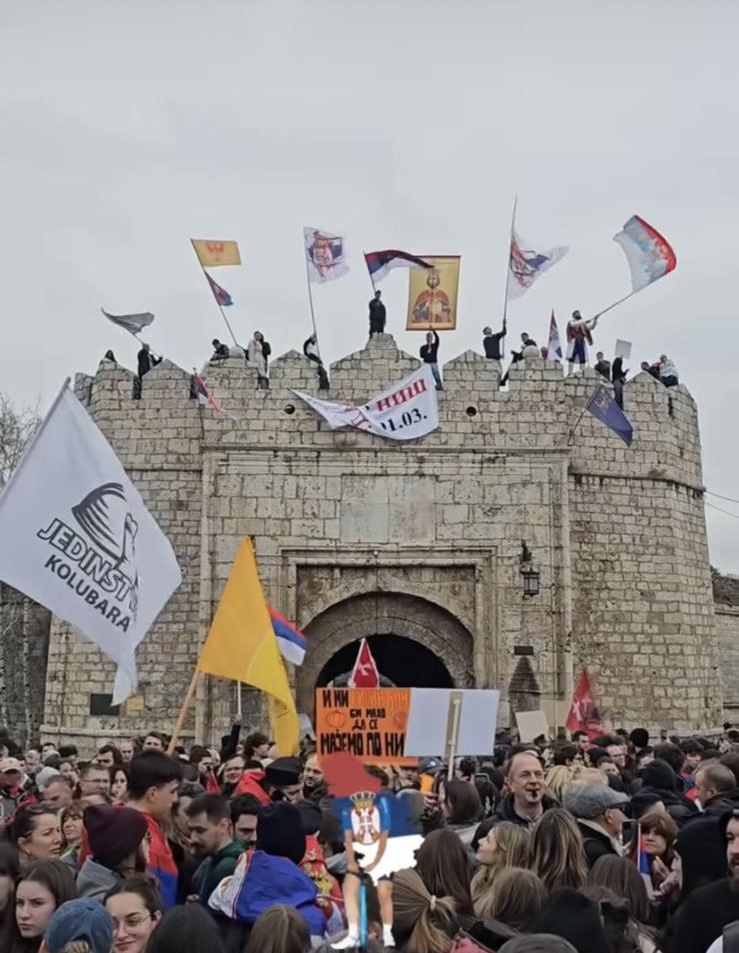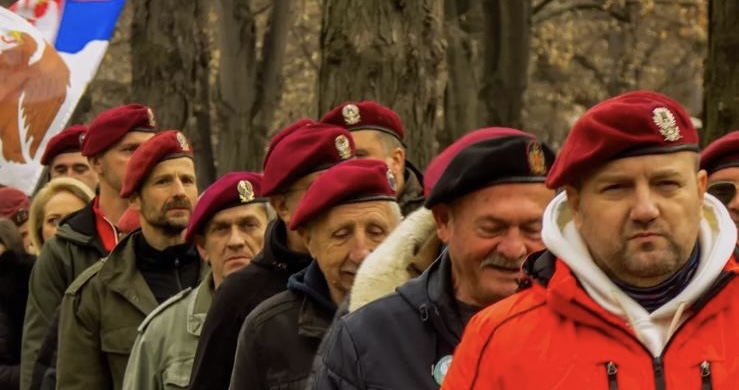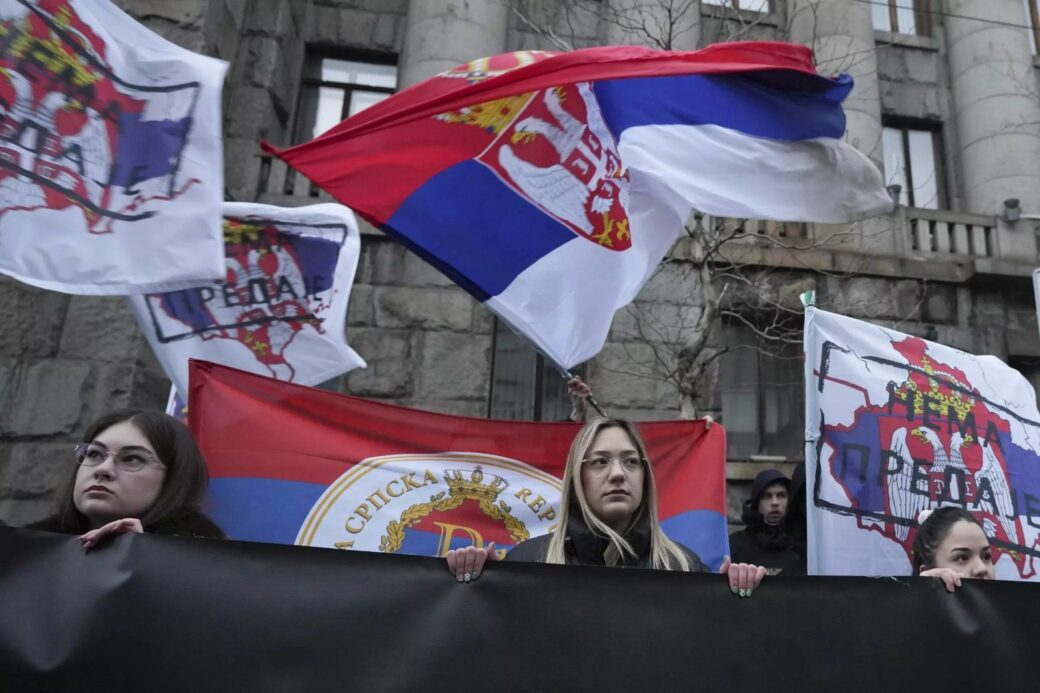Vladimir Arsenijević (1965) is a writer, cultural worker, and activist. His works have been translated into more than twenty languages. He is the president and creative director of the Belgrade-based KROKODIL Association, which organizes the literary festival of the same name. At the student protest in Belgrade on March 15, activist and writer Vladimir Arsenijević carried both the Palestinian and Ukrainian flags as a sign of support and solidarity with the citizens and friends from Gaza and Ukraine, whom the KROKODIL organization has helped find safe shelter in Serbia. Among other demonstrators carrying the Georgian and EU flags, he became a target of vulgar aggressors—people convinced that the dominant narrative of the people’s movement belongs exclusively to them. We spoke with Arsenijević about student protests in Serbia and the possible directions of their further development.
March 15 is behind us, one of the largest protests in the history of Serbia. Is the future of political organizing, which should lead to the overthrow of Vučić’s regime, foreseeable?
The general exaltation surrounding the protests in Serbia, while entirely understandable, does not provide an answer to that question. We at the KROKODIL Association, along with a few activist friends, personally experienced the infiltration of various dark ideologies at this massive protest in Belgrade on March 15—ideologies that are evidently endemic, deeply problematic, yet somehow manage to find their place even within the student protests. On the other hand, there is never a shortage of reasons to continue demonstrating. It feels as though that accumulated energy has not yet run out.
On the contrary, the regime in Serbia always makes sure to add yet another reason for the protests to continue. This time, it was the sound cannon that exploded just as the day was coming to an end, during the fifteen minutes of silence. That was the moment when it became clear—just as it ultimately happened—that despite the massive turnout, there would be no sudden, revolutionary shift. I believe the main issue lies in the fact that students are playing a kind of “pure game,” which grants them moral high ground—a stance that resonates well with a large number of citizens. However, I’m not sure how productive it is in the long run. This relates to their approach to Serbia’s real political environment, which is entirely tainted. It is generally considered a great virtue to maintain a carefree distance from that milieu, but I question whether that is a viable strategy for real change.
This is nothing new. Even during the student protests of the 1990s, it was considered important to separate them from demonstrations organized by the political opposition or various civic and anti-war organizations. And while that approach may seem admirable, when you try to piece together the elements that would logically lead to actual political change, you realize that certain crucial parts of the puzzle are missing. One of the key missing links in all of this is direct engagement with real political actors. Whether we like it or not, the only entities capable of channeling the energy generated by the students—an energy that later resonated with various other social groups—are political parties operating within institutions. Without that, no real change can happen. The only alternative would be a strictly revolutionary shift, for which, I would argue, no one is truly prepared.
On social media—those platforms for all kinds of nonsense—we see countless mindless comments claiming that students and their plenums should be the ones running this country, which is, of course, formally impossible. Despite everything, there is still no clear path to the ultimate removal of Vučić and his regime, except for their voluntary withdrawal. It seems that, despite the general excitement, things have stalled. And the time lost in this fundamental indecisiveness has been seized by far-right political organizations. They have very, very successfully infiltrated the protests under the banner of national unity and the ever-desired “sabornost,” which remains Serbia’s central and seemingly indestructible fetish. Now, we see all sorts of hyper-Orthodox and Chetnik insignia, imperialist territorial longings, slogans about reclaiming Kosovo, along with Russian flags and symbols—while at the same time, there is an unspoken but powerful censorship of other symbols. Try showing up at the protest with an LGBTIQ flag and see how that goes. Yet, a significant number of citizens believe this is a sacrifice worth making because, supposedly, nothing is worse than Aleksandar Vučić’s rule—not even this revisionist syncretism and the fantasy of a post-Vučić paradise where all Serbs will finally live together in national bliss and happiness until the end of time.

What is the biggest problem of political organizing, not just for the opposition but for all anti-regime forces?
The opposition is completely fragmented—both vertically and horizontally. It lacks vision. The only notable exception is the Green-Left Front, at least in certain aspects. These are people who bring a different, and for me, a far more acceptable sensibility into the realm of realpolitik. Aside from them, there is practically no one to whom the energy of this movement can be safely entrusted, with any confidence that they will know how to use it in the way it should be used. This brings us back to the story of our infamous and never-realized October 6th. We placed all our hopes in October 5th, 2000. We believed that toppling Milošević was the only thing that mattered and that everything else would fall into place easily. It turned out, of course, that this was far too naive. Still, we genuinely believed we were opening the door to a new future. Given that we had already stepped into a new decade, a new century, and a new millennium, it felt as though even the planets had aligned in favor of our better future. And yet, here we are, twenty-five years later, drawing the same conclusions and asking ourselves the same questions—questions we have failed to answer convincingly for an entire quarter-century. Our biggest delusion and naivety back then lay in that elusive third-person plural. We kept talking about us without ever reaching a consensus on who exactly we were. Each of us projected our own separate visions of the future into that vague collective, and those visions had no real common ground—except for the desire to see Milošević gone. Today, when I look at who is protesting against Vučić, I honestly feel like crying. Among us are people who share absolutely all the same values as him—down to the most horrifying details. When we took to the streets on March 15 carrying Ukrainian, Georgian, Palestinian, and EU flags, and when we experienced what we did, we had first reached out to various people and organizations, inviting them to join us. Unfortunately, they refused—some openly admitted they were afraid, while others claimed our intention violated the students’ directive that no flags other than the Serbian flag should be present at the protest. They spoke of certain “civilizational values” as a reason to remain passive and step back—to essentially accept defeat. Meanwhile, others had already contaminated the space with their own symbols, which no one had the will or courage to remove. We wanted to stand against that.
Earlier, you mentioned that people were naive when they protested against Milošević, at least a good part of them… Are people today naive with similar intentions?
The reason this protest succeeded is that it had two, or rather three, general rehearsals. First, we had the activities around Belgrade Waterfront, then the large eco-protests, and finally the Serbia Against Violence protests. It became clear that all of them lacked the element of youth that the students have now brought in, and this triggered a powerful chemical reaction. The pendulum has swung so far that it seems like it can’t stop anymore. However, we still don’t understand what the ultimate goal of the protest actually is. Is it the fulfillment of demands related to the Novi Sad tragedy? Or the fall of Vučić? Okay, but what comes after that? In the mass refusal to consider things to their logical conclusion, discussions are cut off at this point, and rational thinking is replaced by an excessive glorification of the students’ supposed supernatural wisdom, while any attempt, even the most well-meaning criticism, is labeled as defeatism. And that is the fundamental flaw of the protest, which, I believe, once again reduces it to a naivety that will, I fear, cost us dearly once again.
Do you think that due to the impending fall of this regime, Aleksandar Vučić will try to destabilize the situation in the region?
Honestly, I don’t know. The government is really as threatened as it has never been before, and who knows what they might come up with. They mostly deal with short-term spin, and we’ve already gone through the phase when these protests were interpreted as a Croatian conspiracy and an attempt by neighbors to undermine the legitimately elected government in Serbia. So, in a certain sense, that’s already an exhausted narrative. What seems to me is that they are secretly hoping this will somehow fizzle out. They’ve probably exhausted many of their options and aren’t sure what to do next. With all the rhetoric that is consistently very insulting and humiliating, and sometimes can even be incendiary.
If we set aside the embarrassment with Students 2.0 in Pionirski Park, as well as the use of the sound cannon, which fortunately didn’t lead to significant consequences, it seems that the authorities are quite indecisive. According to statements from some coalition partners of the ruling party, it seems like there’s a fracture from within and certain uncertainties are surfacing. On the other hand, it must be acknowledged that the police are behaving relatively restrained during the protests. Or even quite restrained. We haven’t had those heavy clashes that are easy to see in Paris, Berlin, or, let’s not even mention, Tbilisi or anywhere else. These are truly very, very peaceful protests, where hundreds of thousands of people spend the whole day on the city streets and everything is fine. The city isn’t even particularly dirty, no windows have been smashed, no one has tried to take advantage of the situation to steal something. Everything is very decent. That’s one feature of the protests that I think one can’t help but notice. How long it will last like this, I really don’t know.

Is there hope that this wave of change we are witnessing will also lead to a revival of the cultural scene? Is there hope for a new avant-garde?
I’m not sure. I walked away from the March 15th protest with very mixed feelings. I mean, it’s not so much about the fact that someone was taking the flag out of my hand and tearing it or about those hooligans, identity activists, and those frantic kids getting in my face and chanting offensive messages. That doesn’t really affect me much; I’m used to it, I know where I live. But the fact that we were surrounded by thousands of people, who were expected not to share the views of those ten or so aggressors, and yet no one lifted a finger, that people were looking at us blankly, as if we were part of some half-bored reality show. A few women even approached us to scold us for allegedly provoking, which is the classic victim-blaming and confirmation of the old thesis that the killer isn’t guilty, but the one who was killed is. Those aggressors surrounded us chanting “only Serbian flags, only Serbian flags,” and then they suddenly stopped.
One woman joined them (because there are always those unfortunate souls who would happily dance in front of the bonfires if given the chance), and in the end, only her voice was left chanting: “only Russian flags, only Russian flags.” That was truly a phenomenal Freudian slip, a deep truth about the wet dreams of our compatriots who would love for Serbia to become a new Russian province. Unfortunately, this mood prevails even among the protesting masses, and one should not deceive themselves about that. It’s not happening only among the peripheral layers of the protest, but in various places simultaneously. Many people on social media these days have eagerly shared a photo of a person with a five-pointed star on his cap embracing a Chetnik with a hajdučka cap and a cockade. The pornography of this new unity is truly horrifying. But many are excited about it, including people one would not expect that from until recently.
What disturbs me the most in all of this is the fact that the so-called “veterans” of the infamous 63rd Parachute Brigade, notorious for the crimes it committed in Kosovo, have somehow become the self-proclaimed paramilitary police of the protests. Who delegated them this right? They line up with their berets and beer bellies, supposedly providing security for the protest while carrying out some kind of “citizen arrests.” There are recordings of them tying people’s hands and taking them somewhere. Does anyone know who these people are? Why were they deprived of their freedom by other civilians who call themselves veterans? Where did they take them? Does anyone care about that? How is something like that even possible? It terrifies me, the arbitrariness of a frantic, street-level justice carried out by people who should primarily be tried for war crimes. Yet, citizens enthusiastically applaud this, cheer on this barbarism, and even eroticize these villains who have inserted themselves into a place where they should never have been, calling them heroes, warriors, true Serbs, champions, wonderful souls, and cool guys, convinced that they will protect us and our children.
I’m not sure if the general mood is as I perceive it, since I’m not present at any plenums or anything similar, but I would really like to know who and with what authority authorized these criminals to establish order on our streets? For me, this is probably the biggest scandal of this entire event and something that strongly alienates me from the further course of the protests. All of this, as I said, doesn’t indicate to me that we’re on the right path. So, I am not able to give a proper answer to the question posed. I believe it is too early to think about a cultural renaissance in any formed and organized future, as none of that is yet even visible in outline.
